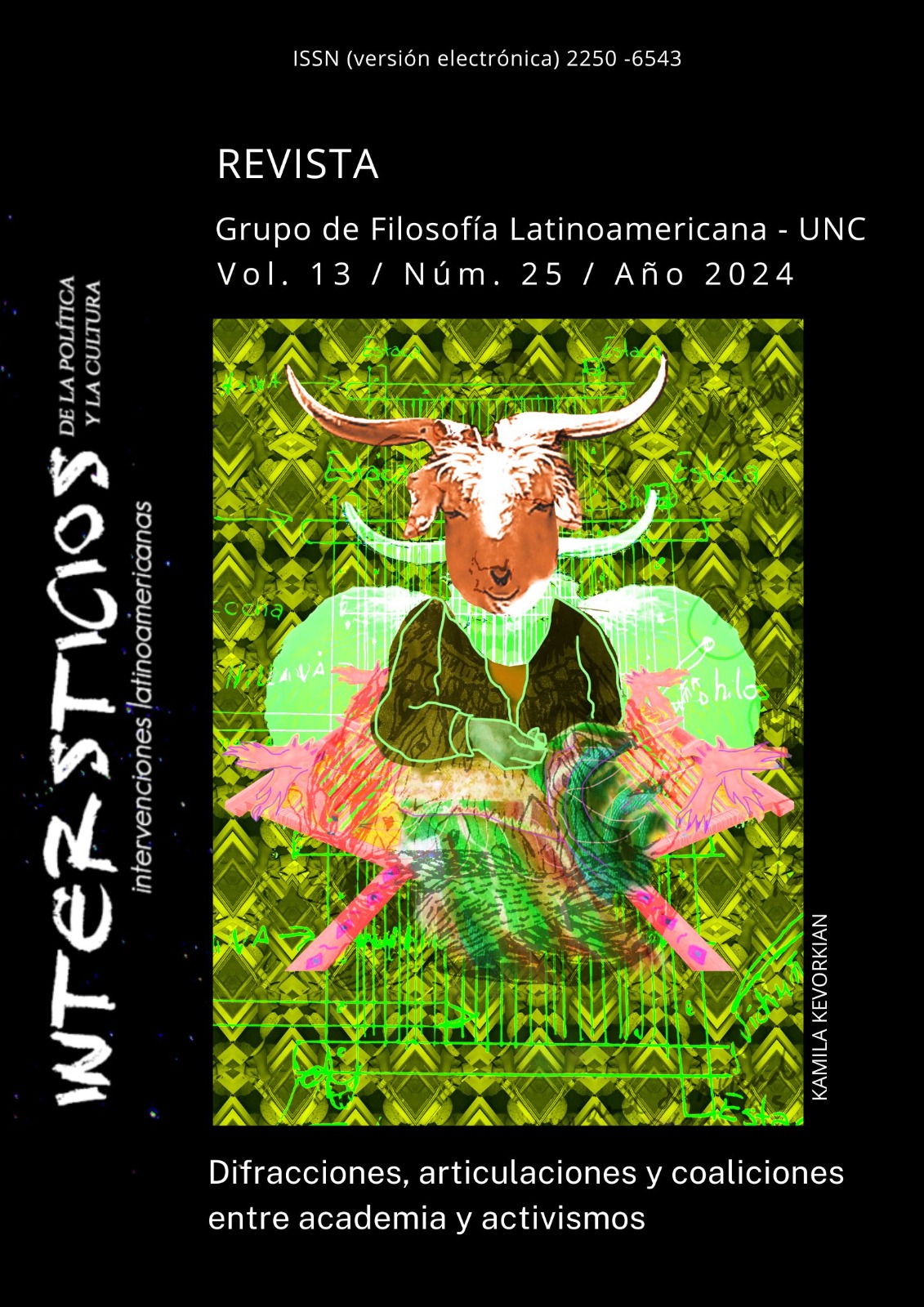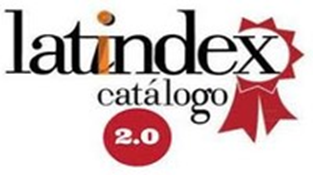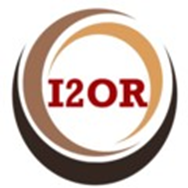Diffractions and Entanglements, Weavings and Mending. For an Onto-Epistemology of Careful Visions and Contacts
Keywords:
Neomateralist feminisms, Extractivism, a priori antropológico, Situated techniquesAbstract
Busy in inquiring into other ways of researching and producing academic activist knowledge, in what follows we introduce the relational ontology of the neomaterialist feminisms of Karen Barad and María Puig de la Bellacasa to provide a critical perspective of representation as a basis for the epistemology. From these positions, “matter comes to matter” and the categories of diffraction and intra-action of the agential realism of the first, appear, and in dialogue, an ethic of caring for touching visions of the second. This vision that touches knowledge is related to the world from affections and encounters, affinities and entanglements that push pre-established dualisms (theory/practice, subject/object, humans/non-humans, matter/discourse, academy/territory) to the limit and reconfigure them carefully. The diffractions of the vision must be able to be combined with the material touching and of the bodies in relational commitments of care involved with tangible transformations of the world. In a commitment to techniques located in the south, we resume the investigations that Tania Pérez-Bustos (and others) have carried out in this materialist key on openwork and weaving with seams to, on the one hand, question the modes of production of techno-scientific knowledge, and thus "accounting for how practices matter", and on the other hand understand how material relationships with others, more- than- humans constitute us.
Downloads
References
Alvarado, Mariana (comp.) Tejiendo. ¿Qué historias contamos cuando investigamos? , editado por María Eugenia Sicilia. - 1a ed. - Guaymallén : Qellqasqa, 2023. Libro digital, PDF Archivo Digital: descarga y online ISBN 978-987-4026-84-2, pp. 153-169 Disponible en: https://qellqasqa.com/omp/index.php/qellqasqa/catalog/book/ISBN%20978-987-4026-84-2
Barad, Karen (2007) Meeting the Universe Halfway. Quantum Physics and the Entanglement of Matter and Meaning. Durham: Duke University Press.
Barad, Karen (2015) “Posthumanist Performativity: Toward an Understanding of How Matter Comes to Matter”, en Materialität denken: Studien zur technologischen Verkörperung - Hybride Artefakte, posthumane Körper, (eds.) C. Bath, Y. Bauer, B. Bock, A. Saupe and J. Weber. (Trans.) Verlag. Bielefeld: 187-216. (Hay traducción por Javiera Moncada, colectivo Pliegue)
Braidotti, Rosi (2015) Lo posthumano, México, Gedisa.
Callén Moreu, B. y T. Pérez-Bustos (2020): “Metodologías con objetos-objeciones metodológicas”, Política y Sociedad, 57(2), pp. 437-458. https://revistas.ucm.es/index.php/POSO/article/view/66452
Ferrando, Francesca (2019) Philosophical Poshumanism, London, Bloomsbury.
Ferrando, Francesca (2021) “Posthumanismo, transhumanismo, antihumanismo, metahumanismo y nuevos materialismos”, trad. Javier Ignacio Brito Ledesma, en Ethika No. 5, pp. 151-166. https://revistaethika.uchile.cl/index.php/ETK/article/view/65842
Fischetti, Natalia (2022) “Relacionalidades humano- artefactuales. Lecturas de otra filosofía de la técnica” en vol. 21 Antropoficciones, edited by Claudio Celis Bueno & Raúl Rodríguez Freire, Culture Machine, UK, ISSN 1465-4121. https://culturemachine.net/archives/vol-21-antropoficciones/
Fischetti, Natalia (2023) “Feminismo neomaterialista: metodología difractiva en Karen Barad”, Estudios Posthumanos, No. 2, Dossier Culturas tecnológicas, ISSN: 2953-4089, pp. 43-67, Disponible en: https: //www.estudiosposthumanos.com.ar/otoño-2023-culturas-tecnológicas
Haraway, Donna (1995) “Conocimientos situados. La cuestión científica en el feminismo y el privilegio de la perspectiva parcial”, en: Ciencia, cyborgs y mujeres. La reinvención de la naturaleza, trad. Manuel Talens, Madrid: Ediciones Cátedra.
Haraway, Donna (2019) Seguir con el problema. Generar parentesco en el Chthuluceno, trad. Helen Torres, Buenos Aires: Consonni.
Haraway, Donna (2022) Las promesas de los monstruos: Ensayos sobre Ciencia, Naturaleza y Otros inadaptables, trad. Jorge Fernández Gonzalo, CABA: Holobionte.
Harding, Sandra (1996) Ciencia y Feminismo, trad. Pablo Manzano Madrid: Morata
Hollin, G., Forsyth, I., Giraud, E., & Potts, T. (2017). “(Dis)entangling Barad: Materialisms and ethics”. Social Studies of Science, 47(6), 918-941. (Trad. Por Luis A. Benavides, voluntario de Colectivo Pliegue)
Pérez-Bustos, Tania (2016). “El tejido como conocimiento, el conocimiento como tejido: reflexiones feministas en torno a la agencia de las materialidades.” Rev. Colomb. Soc., 39 (2), 163-182. https://revistas.unal.edu.co/index.php/recs/article/view/58970
Pérez-Bustos, Tania. & Márquez, S. (2016) “Destejiendo puntos de vista feministas: reflexiones metodológicas desde la etnografía del diseño de una tecnología”. Revista Iberoamericana de Ciencia Tecnología Y Sociedad, 10(31), 1-18. http://www.revistacts.net/contenido/numero-31/destejiendo-puntos-de-vista-feministas-reflexiones-metodologicas-desde-la-etnografia-del-diseno-de-una-tecnologia/
Puig de la Bellacasa, Maria (2017) Matters of Care. Speculative Ethics in More than Human Worlds. Minneapolis: University of Minnesota Press. Hay traducción parcial: http://www.editorialconcreta.org/_Maria-Puig-de-la-Bellacasa_
Torrano, Andrea y Fischetti, Natalia (2018) “Apuestas del feminismo: Ciencia/Técnica/Latinoamérica. Nuevas urdimbres desde el Sur” En: Dossier Hacia un buen vivir feminista. RevIISE, Revista de Ciencias Sociales y Humanas, vol. 11, año 11, abril 2018. Instituto de Investigaciones Socio-Económicas, UNSJ, pp. 267-279. http://www.ojs.unsj.edu.ar/index.php/reviise/article/view/225
Downloads
Published
Issue
Section
License

This work is licensed under a Creative Commons Attribution-NonCommercial-ShareAlike 4.0 International License.
Authors who have publications with this journal agree to the following terms:
a. Authors will retain their copyright and grant the journal the right of first publication of their work, which will simultaneously be subject to the Creative Commons Attribution License that allows third parties to share the work as long as its author and first publication in this journal are indicated.
b. Authors may adopt other non-exclusive license agreements for distribution of the published version of the work (e.g., deposit it in an institutional telematic archive or publish it in a monographic volume) as long as the initial publication in this journal is indicated.
c. Authors are allowed and encouraged to disseminate their work through the Internet (e.g., in institutional telematic archives or on their web page) after the publication process, which may produce interesting exchanges and increase citations of the published work (see The effect of open access).











